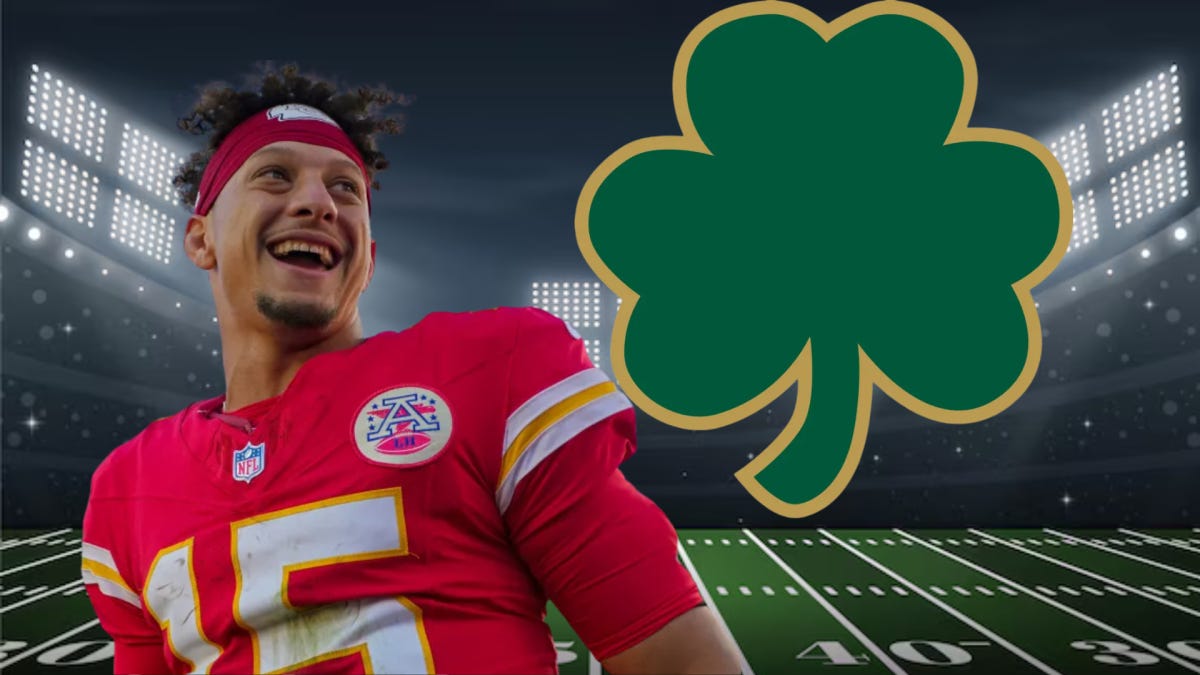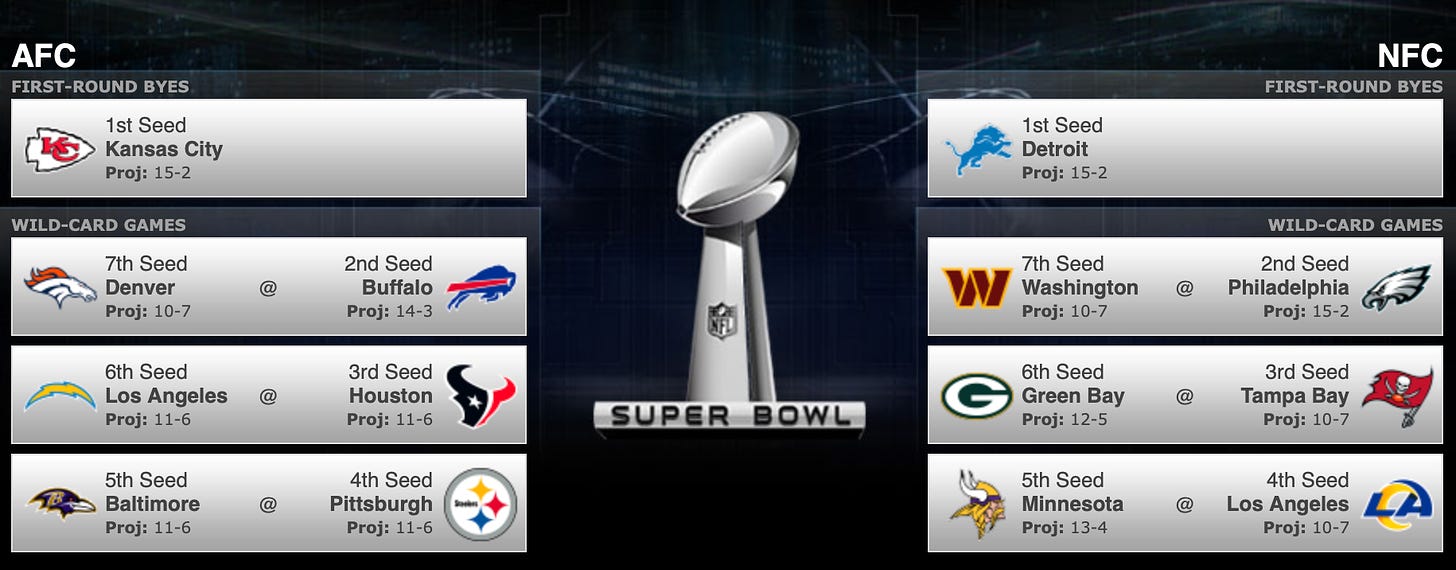Has the Power of Home Field Advantage Diminished?
1. Current Home vs. Away Win-Loss Record:
• At 114-110 (.509), home teams are barely above .500 this season. This is well below historical norms, suggesting that the home field isn’t the decisive factor it once was.
• Normalizing for team strength (home vs. away) is essential, and the average spread of -0.6 against home teams (with total W/L of the home and away teams within the margin of error) further supports the declining advantage.
2. Historical Trend:
• The decline in home-field advantage is clear:
• 56% (last 10-year average)
• 54% (2022)
• 53% (2023)
• 51% (2024) – would be the lowest since 1972.
This steady downward trend points to structural changes in the game rather than isolated anomalies.
3. Team Performance Outliers:
• Dominant home teams (Chiefs, Bills, Vikings) and abysmal home teams (Giants, Bengals) highlight that home-field advantage varies greatly by franchise, suggesting other factors at play (e.g., roster strength, coaching).
Reasons for Decline:
The question on why is rather tough. Here are the potential reasons:
1. Improved Communication and Less Crowd Noise Impact:
• Advances in technology (headsets, communication protocols) and a shift in stadium design to prioritize fan experience over intimidating noise contribute to reducing the traditional disruptions caused by home crowds.
2. Enhanced Travel and Preparation:
• Teams now arrive better prepared, minimizing the effects of fatigue and unfamiliarity associated with away games.
3. Increased League Parity:
• The NFL’s competitive balance ensures most teams are closely matched. Perhaps the top few teams and bottom few teams are a tier removed, but the middle 20 are not. Even on the road, well-coached teams with efficient offenses and defenses can win.
4. Decline of Regional and Field-Based Advantages:
• Modern stadiums with advanced turf and controlled climates reduce the home team’s environmental advantages. Historical examples like Lambeau Field’s cold-weather dominance are less impactful.
5. Rules and Strategy Evolution:
• Rules favoring offensive production (e.g., protecting quarterbacks, reducing defensive contact) empower visiting teams. Additionally, aggressive, analytics-driven play-calling minimizes situational advantages (e.g., there is not a statical advantage on crowd influence for fourth-down conversions on the road).
Comparison to Historical Norms:
• The shift from a 56% win rate to 51% over the past decade is statistically significant and not easily attributable to randomness.
• The NFL’s deliberate parity measures (e.g., salary cap, draft order) aim to equalize team strength, diminishing the impact of external factors like home-field advantage.
Implications for Teams and Bettors:
• Teams:
• Strategic preparation for road games can yield comparable results to home games.
• Leveraging situational strengths (e.g., weather, crowd noise) is increasingly less critical.
• Bettors:
• If you feel a team is getting a large benefit for being home, it’s time to fade ATS. Betting markets this season already favor away teams in spreads (-0.6 average for home teams), signaling that the industry has realized and adapted to the trend.
• Look for anomalies (e.g., the Chiefs’ 7-0 home record) when analyzing home-field dynamics.
Are the Chiefs the luckiest 13 win team ever?
The best way to do look at this objectively is to look at average points differential per game, for which the KC Chiefs stand at +5 PPG (even that only with the help of a 14-point win last week). Of the 105 teams that have started the season off with this many wins, only three (the 2022 Vikings, 2019 Packers, and the 1999 Titans) have had such a low point differential. They may not be the luckiest team ever to this point, but they’re certainly in the 95th percentile of luck. Now if you factor in the fluky wins with one toe out of bounds (vs. Ravens), a blocked short FG (vs. Denver), blatant missed holding penalty and doink short FG made (vs. Chargers), an argument could be made.
ESPN NFL Playoff Machine after Week 15. Three Weeks Left.
Johnathan Taylor fumbles before the goal line and the Colts unravel from there
Analytics-Based Power Rankings¹
NFL
Buffalo Bills (+1)
Detroit Lions (-1)
Philadelphia Eagles (+1)
Kansas City Chiefs (-1)
Baltimore Ravens
Minnesota Vikings (+4)
Green Bay Packers
Pittsburgh Steelers (+1)
Houston Texans (-1)
Los Angeles Chargers
Denver Broncos (+1)
Tampa Bay Buccaneers (+6)
Seattle Seahawks (+2)
Los Angeles Rams
Washington Commanders (-4)
San Francisco 49ers
Cincinnati Bengals (+1)
Miami Dolphins (+1)
Arizona Cardinals (+1)
Atlanta Falcons (-3)
Indianapolis Colts
New Orleans Saints
New York Jets
Dallas Cowboys
New England Patriots
Carolina Panthers (+3)
Cleveland Browns (-1)
Chicago Bears (-1)
Tennessee Titans (-1)
Jacksonville Jaguars
Las Vegas Raiders
New York Giants
NHL
Carolina Hurricanes
Edmonton Oilers (+1)
Dallas Stars (-1)
Florida Panthers
New York Rangers
Toronto Maple Leafs
New Jersey Devils
Minnesota Wild
Colorado Avalanche
Winnipeg Jets (+1)
Vegas Golden Knights (-1)
Tampa Bay Lightning
Washington Capitals (+1)
Vancouver Canucks (-1)
LA Kings (+1)
Boston Bruins (+1)
Ottawa Senators (+1)
Calgary Flames (+1)
NY Islanders (-1)
Nashville Predators (-4)
Pittsburgh Penguins (+5)
Utah Hockey Club (-2)
Saint Louis Blues (-1)
Buffalo Sabres (+2)
Seattle Kraken (-2)
Detroit Red Wings (-2)
Philadelphia Flyers
Chicago Blackhawks
Montreal Canadiens
Anaheim Ducks
Columbus Blue Jackets
San Jose Sharks
NBA
Boston Celtics
Oklahoma City Thunder
Dallas Mavericks (+2)
New York Knicks (-1)
Cleveland Cavaliers (-1)
Denver Nuggets (+1)
Minnesota Timberwolves (-1)
Phoenix Suns
Golden State Warriors
Milwaukee Bucks (+1)
Orlando Magic (+2)
Memphis Grizzlies
Houston Rockets (+3)
Los Angeles Lakers (-3)
Philadelphia 76ers (-1)
Miami Heat (+1)
Indiana Pacers (-1)
Los Angeles Clippers (+1)
Sacramento Kings (-1)
Atlanta Hawks (+1)
San Antonio Spurs (-1)
New Orleans Pelicans
Charlotte Hornets (+1)
Portland Trail Blazers (-1)
Chicago Bulls (+1)
Toronto Raptors (-1)
Detroit Pistons
Utah Jazz
Brooklyn Nets
Washington Wizards
MLB 2025
Los Angeles Dodgers
New York Yankees
Atlanta Braves
New York Mets (+2)
Philadelphia Phillies (-1)
Houston Astros (-1)
San Diego Padres (+1)
Baltimore Orioles (-1)
Cleveland Guardians
Chicago Cubs (+1)
Seattle Mariners (-1)
Texas Rangers (+1)
Boston Red Sox (+2)
Detroit Tigers
Milwaukee Brewers (+1)
Arizona Diamondbacks (-5)
Minnesota Twins
San Francisco Giants (+1)
Kansas City Royals (-1)
Cincinnati Reds
St. Louis Cardinals
Tampa Bay Rays
Toronto Blue Jays
Washington Nationals
Pittsburgh Pirates
The Athletics
Miami Marlins
Los Angeles Angels
Colorado Rockies
Chicago White Sox






